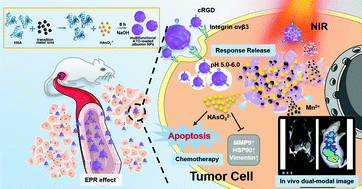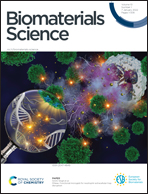Arsenite-loaded albumin nanoparticles for targeted synergistic chemo-photothermal therapy of HCC†
Abstract
Arsenic trioxide (ATO, As2O3), an active ingredient of traditional Chinese medicine, has been approved by the U.S. Food and Drug Administration as an effective therapeutic agent for acute promyelocytic leukemia (APL). However, the application of ATO in treating advanced solid tumors like hepatocellular carcinoma (HCC) is still restricted by limited therapeutic efficacy and insufferable side effects. To solve this problem, we reported a general and facile strategy using human serum albumin (HSA) as a template for synthesizing a series of ATO-based nanoparticles with uniform single-albumin size. Then, we prepared a multifunctional drug delivery system (MDDS) based on MnAs/HSA termed MnAs/ICG/HSA-RGD, and tested its efficacy both in vitro and in vivo. Our results revealed that the photothermal effect of MnAs/ICG/HSA-RGD can not only cause irreversible damage to the tumor but also accelerate the discharge of As and Mn2+ ions, enabling responsive chemotherapy and magnetic resonance imaging. Interestingly, the expression of HSP90, vimentin, and MMP-9 in tumor cells was inhibited during the treatment, resulting in less metastasis and recurrence. Moreover, no apparent side effect has been observed during the treatment. Therefore, MnAs/ICG/HSA-RGD can be considered as a promising option for HCC with excellent therapeutic efficacy and minimum side effects.



 Please wait while we load your content...
Please wait while we load your content...